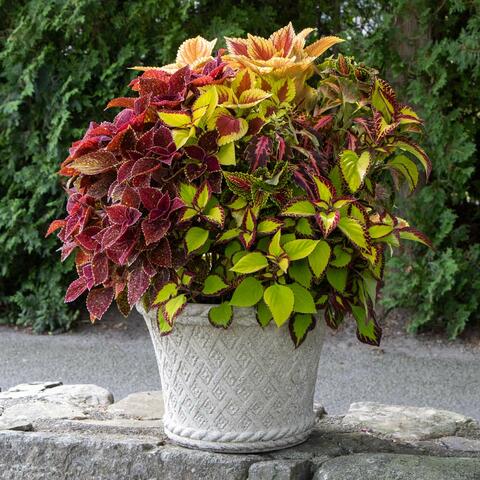Coleus Care
Latin Name Pronunciation: ko'lee-us Traditionally, Coleus have been terrific foliage plants for shade, but many of the new varieties are also quite tolerant of sun. Variations in light intensity can have a dramatic impact on leaf color and plant size. Their diversity of foliage color, leaf shape, and growth habit make Coleus a valuable container and bedding plant, especially in shade where summer color is scarce.
Light/Watering: Coleus grows best in partial shade, though newer varieties tolerate full sun. All Coleus prefer evenly moist garden soil.
Fertilizer/Soil: If you grow Coleus in containers, we recommend that you incorporate a timed-release fertilizer at planting time; we also suggest using a balanced, water-soluble fertilizer every two weeks. For plants in the ground, fertilizing once a month is enough–with the fertilizer diluted to half-strength. Coleus prefers well-drained soil.
Pruning: Where the growing season is long, pinch the tips of the stems regularly to encourage brancing and compact growth. It is commonly recommended that the blooms of Coleus be removed as soon as they appear because they detract from the foliage display. Bloom is sparse on the varieties we offer, and the small lavender-blue flowers are neither unattractive nor very showy; it hardly seems worth the trouble to cut them off.
Companion Plants: Colorful Coleus complements any number of other favorite annuals including Sweet Potato vine, Fuchsia, Begonia, Dusty Miller, Impatiens, and Lantana, to name a few.
End of Season Care: Hardy only to Zone 10, plants cannot withstand frost without damage. In colder climates, plants can be overwintered without difficulty on a sunny windowsill, or take tip cuttings in early fall to start new plants. Coleus root very readily.



